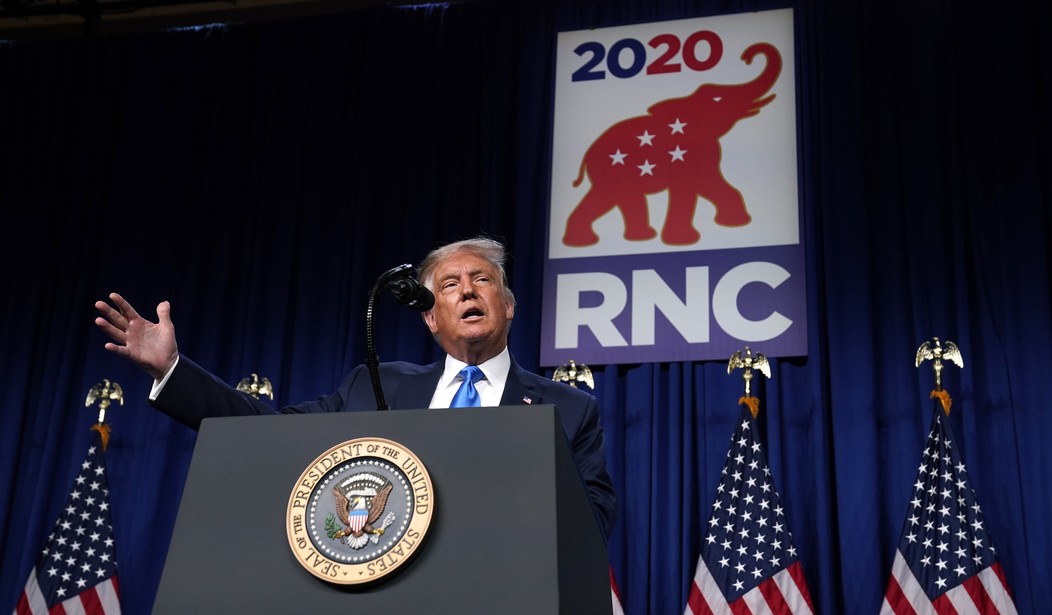The Democratic Party propaganda machine, more commonly known as the mainstream media, has been gushing over the establishment Republicans who appeared at the Democratic National Convention to denounce President Trump and endorse Joe Biden, but as last night’s Republican National Convention showed, the days of the Republican Party being a pale shadow of the Democrats are over. In 2020, as in 2016 but not for a considerable period before that, we actually have a choice, not an echo, as Barry Goldwater offered America way back in 1964.
As Rating America’s Presidents: An America-First Look at Who Is Best, Who Is Overrated, and Who Was An Absolute Disaster demonstrates, the United States has been under the control of what is essentially a one-party system in two factions since at least the early 1950s. One of the most damaging aspects of the presidency of Dwight D. Eisenhower, the first Republican president since the onset of the Great Depression, was his refusal to challenge the basic premises of the New Deal. That’s how we got into this fix.
The Eisenhower administration was generally a period of great prosperity. However, after twenty years of New Deal expansion of the government, it was widely expected by observers from both parties that Eisenhower would at least attempt to fight the leviathan and diminish the gargantuan and ever-growing federal government. Instead, he did little to halt the expansion of federal power. He resisted numerous measures that would have repealed or rolled back New Deal programs. He was determinedly bipartisan, going along with numerous Democratic initiatives, even when they involved the centralization that he warned against. In 1954, he stated his guiding philosophy: “I have just one purpose, outside of the job of keeping this world in peace…and that is to build up a strong progressive Republican Party in this country. If the right wing wants a fight, they are going to get it. If they want to leave the Republican Party and form a third party, that’s their business, but before I end up, either this Republican Party will reflect progressivism or I won’t be with them anymore.”
George W. Bush, John McCain, Mitt Romney, and Paul Ryan couldn’t have said it better.
With the Republicans implementing large government programs, and the Democrats remaining the standard-bearers for an expanded federal government, voters had no choice but to accept it.
Even Eisenhower realized this. In 1964, three years out of office and a popular and respected elder statesman, he wrote an article for the Saturday Evening Post entitled “Why I Am a Republican.” In it, he declared:
I am increasingly disturbed by the steady, obvious drift of our nation toward a centralization of power of the Federal Government. And in this fact is found the primary reason why I sincerely urge all voters, no matter their present political affiliations, to take a fresh, thoughtful look at the basic Republican philosophy and Republican performance as compared to that of the Democrats. For the hard fact is that under many years of Democratic Party leadership our country has been lured into the ‘easy way,’ a path of federal expediency which, like a narcotic, may give us a false sense of well-being, but in the long run is dangerous to our future, our basic rights, our moral fiber and our individual freedom.
That meant that both parties endorsed a rapidly expanding federal government, higher taxes, and more state interference in the daily lives of Americans. His 1964 article suggests that, by then, he had seen the error of his ways. But by then, it was too late.
Eisenhower’s “Modern Republicanism” reduced the Republican Party to a faint echo of the Democrats. Democrats would formulate grand proposals that generally involved a massive expansion of government spending and control, and instead of challenging these proposals at their foundations and arguing against them on principle, Republicans would merely quibble that they could be implemented more cheaply and efficiently. Eisenhower ensured that even when Republicans were in the majority, they continued to have a minority mentality: the Democrats were setting the agenda for the country.
There would be pushback against this assumption within the Republican Party, but the dominant mainstream of Republicanism ever since Ike has been to say “Me too” to the Democrats, rather than “I object.” Eisenhower didn’t originate the idea of making the Republican Party a pale copy of the Democratic Party, rather than a genuine principled opposition: FDR’s opponents Alf Landon, Wendell Willkie, and Thomas E. Dewey would likely have done much the same thing, but they lost and he won, so Eisenhower must be credited as the primary architect of what is essentially a single party in two factions that has, for the most part, governed America since the 1950s.
Rating America’s Presidents shows that while Ronald Reagan gave some pushback to this one-party rule, it has not been until the presidency of Donald J. Trump that it has been seriously challenged. The two-party system is back, or more precisely, the one-party system is facing off against one determined individual who is attracting an increasingly large following. This November will be decisive for the question of whether the one-party elites will in the future exert their hegemony unchallenged, as they did for so long.
Night 2: Liveblogging the 2020 Republican National Convention
Robert Spencer is the director of Jihad Watch and a Shillman Fellow at the David Horowitz Freedom Center. He is author of 21 books, including the New York Times bestsellers The Politically Incorrect Guide to Islam (and the Crusades) and The Truth About Muhammad. His latest book is Rating America’s Presidents: An America-First Look at Who Is Best, Who Is Overrated, and Who Was An Absolute Disaster. Follow him on Twitter here. Like him on Facebook here.










Join the conversation as a VIP Member